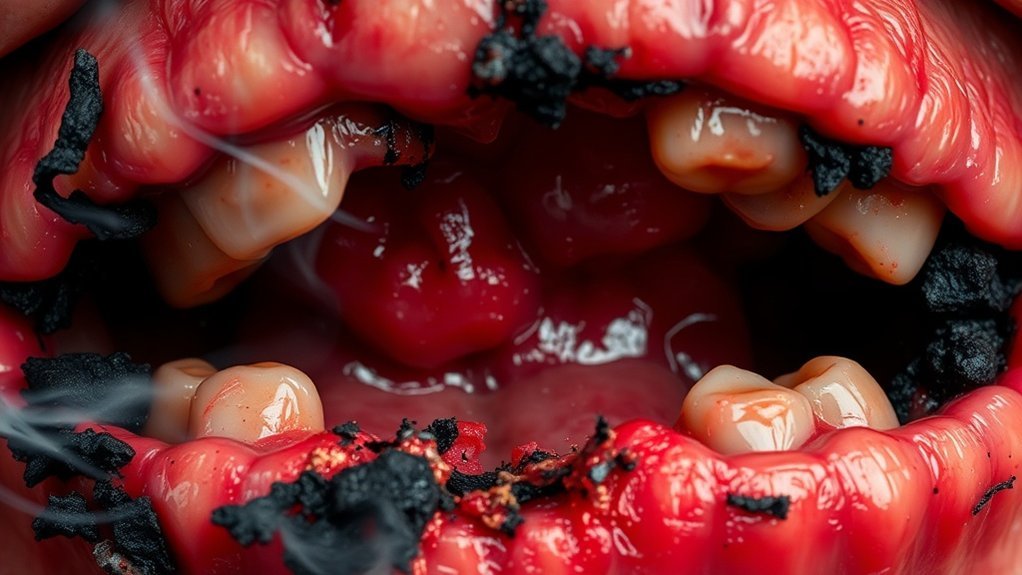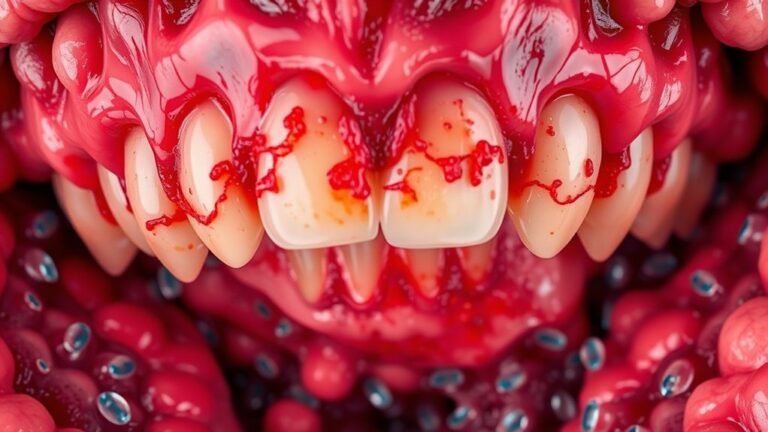How Does Smoking Affect Gum Inflammation and Damage Oral Tissues
Smoking markedly worsens gum inflammation and damages oral tissues by constricting blood vessels, which limits oxygen and nutrients essential for healing. This impairment reduces immune function, making it harder for your body to combat infections, leading to increased susceptibility to gum disease. Chronic inflammation from these factors can result in bleeding gums and more severe periodontal issues. Understanding these effects can help you take vital steps towards improving your oral health and fighting gum disease effectively.
Key Takeaways
- Smoking constricts blood vessels, reducing oxygen delivery to gums and impairing healing processes, exacerbating gum inflammation.
- Tobacco use increases the risk of gum disease by promoting pathogenic bacterial growth and disrupting oral microbiota balance.
- Impaired immune function from smoking reduces the effectiveness of white blood cells, leading to increased susceptibility to infections and inflammation.
- Chronic inflammation from smoking can result in persistent bleeding gums and progression to periodontal disease, increasing the risk of tooth loss.
- Regular dental check-ups are vital for smokers to detect early gum issues and manage inflammation effectively through professional care.
Understanding Gum Inflammation
Gum inflammation, or gingivitis, occurs when bacteria in plaque irritate the gum tissue. You might notice symptoms like redness, swelling, or bleeding gums. This condition arises when oral hygiene practices falter, allowing plaque to accumulate and biofilm to develop. Research indicates that untreated gum inflammation can progress to periodontal disease, considerably affecting oral tissues and overall health. Bacteria from inflamed gums can enter the bloodstream, leading to systemic issues. It’s essential to understand that the inflammatory response is a protective mechanism, but chronic inflammation can lead to tissue destruction. Regular dental check-ups and effective daily oral care can help mitigate gum inflammation, preserving both the health of your gums and the integrity of your oral tissues.
The Role of Tobacco in Oral Health
While many people may underestimate the impact of tobacco on oral health, its detrimental effects on the gums and surrounding tissues are well-documented. Tobacco use considerably increases the risk of developing gum disease, primarily due to its ability to impair blood flow and hinder healing processes. Research indicates that nicotine constricts blood vessels, reducing oxygen delivery to oral tissues, which is essential for maintaining gum health. Additionally, tobacco’s toxins disrupt the balance of oral microbiota, promoting pathogenic bacteria that exacerbate inflammation and tissue damage. As a result, smokers are more likely to experience severe gum disease, tooth loss, and other oral health issues. Understanding these implications is critical for anyone considering the long-term effects of tobacco on their oral health.
How Smoking Triggers Gum Disease
Smoking greatly compromises your immune system, making it harder for your body to fight off infections, including those affecting your gums. Additionally, tobacco use reduces blood flow to your oral tissues, impairing healing and promoting an environment conducive to harmful bacterial growth. This combination of factors directly contributes to the onset and progression of gum disease.
Tobacco’s Impact on Immunity
When you smoke, the harmful substances in tobacco can disrupt your immune system, making it harder for your body to fight off infections, including those affecting your gums. This immune suppression leads to an increased risk of gum disease, as your body struggles to combat bacteria that thrive in your oral cavity. Smoking reduces the effectiveness of immune cells, diminishing their ability to respond to pathogens, which can result in gingival bleeding and inflammation. Additionally, the toxic components in tobacco can impair the healing processes of oral tissues, further complicating recovery from infections. Over time, this cycle exacerbates gum disease, ultimately putting your oral health at serious risk. Taking action to quit smoking can greatly improve your gum health and overall immunity.
Reduced Blood Flow
The inflammatory response triggered by smoking also involves reduced blood flow to the gums, a critical factor in the development of gum disease. When you smoke, the nicotine constricts blood vessels, impairing circulation to the gum tissue. This decreased blood flow limits essential nutrient and oxygen delivery, which are crucial for maintaining healthy gums. As a result, the gum tissue becomes more susceptible to inflammation, leading to conditions like gingivitis. Without adequate blood flow, the body struggles to fight off infections effectively, exacerbating inflammation and tissue damage. Ultimately, this impaired vascular response not only promotes gingivitis but can also accelerate the progression to more severe periodontal disease, putting your oral health at significant risk.
Bacterial Growth Promotion
While many factors contribute to gum disease, smoking considerably enhances bacterial growth in the oral cavity. This is primarily due to the disruption of your oral microbiome, which normally maintains a balance between beneficial and harmful bacteria. Smoking introduces toxins that promote the proliferation of pathogenic bacteria, leading to dysbiosis. Studies indicate that smokers have higher levels of specific bacteria, such as Porphyromonas gingivalis, linked to periodontal disease. Additionally, the inflammatory response triggered by these bacteria is exacerbated in smokers, compounding tissue damage. Consequently, the presence of harmful bacteria in your mouth not only compromises your gum health but also increases the risk of developing severe oral conditions. Understanding this relationship is crucial for effective prevention and treatment strategies.
The Impact of Nicotine on Gum Tissues
Nicotine, a primary component of tobacco, directly affects gum tissues by promoting inflammation and impairing healing processes. When you smoke, nicotine constricts blood vessels, reducing blood flow to your gums. This diminished circulation hampers the delivery of essential nutrients and oxygen, making it harder for your gums to heal from inflammation. Studies have shown that smokers experience increased levels of pro-inflammatory cytokines, which exacerbate gum inflammation and tissue damage. In addition, nicotine alters the behavior of fibroblasts, key cells responsible for gum tissue repair, leading to delayed healing and increased tissue degradation. As a result, if you’re a smoker, you’re likely at a higher risk for periodontal disease, making understanding nicotine’s impact on gum tissues vital for maintaining oral health.
Compromised Immune Response in Smokers
When you smoke, your body experiences a significant reduction in white blood cells, which are essential for fighting infections. This decrease compromises your immune response, making it harder for your gums to heal after inflammation or injury. As a result, the impaired healing process can lead to more severe gum disease and other oral health issues.
Reduced White Blood Cells
Although smoking is often associated with immediate respiratory effects, its impact on the immune system, particularly the reduction of white blood cells, is equally significant. When you smoke, the toxins in cigarette smoke can inhibit the production and function of these essential immune cells. This reduction leads to a compromised immune response, making it harder for your body to combat infections, including those related to gum inflammation. Consequently, smokers are at a heightened risk for periodontal disease, as their bodies struggle to fight off bacterial infections that contribute to gum deterioration. Research shows that lower white blood cell counts correlate with increased inflammation and disease progression, emphasizing the important link between smoking and oral health.
Impaired Healing Process
Smoking greatly impairs the healing process, largely due to the compromised immune response it triggers. When you smoke, the toxins present in cigarettes hinder the activity of immune cells, particularly neutrophils, which are vital for fighting infection and facilitating gum healing. This reduction in immune efficacy leads to increased gum inflammation, as your body struggles to manage bacterial presence effectively. Studies show that smokers often experience prolonged recovery periods after periodontal treatments, as their weakened immune response slows tissue regeneration. The impaired blood flow associated with smoking further exacerbates this issue, limiting the delivery of essential nutrients and oxygen to the gums. Consequently, if you’re a smoker, your gum health is at greater risk, and healing becomes a markedly challenging process.
Signs and Symptoms of Gum Inflammation
Gum inflammation, often characterized by a range of noticeable signs and symptoms, can greatly impact oral health if left unaddressed. One of the most common indicators you might experience is gum swelling, which occurs as your body responds to plaque buildup and bacteria. This swelling can make your gums appear red and puffy, signaling the need for attention. Additionally, you may feel gum pain, which can vary from mild discomfort to severe sensitivity, particularly when chewing or brushing. Bleeding during oral hygiene routines is another critical symptom, indicating that inflammation is present. Recognizing these signs early can help prevent further complications, emphasizing the importance of regular dental check-ups and effective oral hygiene practices to combat gum inflammation.
Long-term Consequences of Smoking on Oral Health
While many people may underestimate the impact of smoking on their oral health, the long-term consequences can be profound and detrimental. Chronic smoking considerably increases your risk of developing gum infections, as it impairs blood flow and weakens immune responses. Over time, this leads to persistent inflammation, resulting in symptoms like bleeding gums. The nicotine in cigarettes also hinders the healing process, making it harder for your body to recover from oral diseases. Ultimately, prolonged exposure to tobacco can contribute to periodontal disease, tooth loss, and even oral cancer. Understanding these risks can help you make informed decisions about your health, emphasizing the urgent need for intervention to mitigate these severe consequences.
Preventive Measures for Smokers
To mitigate gum inflammation linked to smoking, it’s vital to prioritize regular dental check-ups, as these allow for early detection and management of oral health issues. Participating in quit smoking programs can greatly reduce the risk of further complications. Additionally, maintaining effective oral hygiene practices is essential for reducing inflammation and promoting overall gum health.
Regular Dental Check-ups
Regular dental check-ups are crucial for smokers, as they help detect early signs of gum inflammation and other oral health issues that can arise from tobacco use. Smokers often experience increased gum irritation, which can lead to severe dental problems if not addressed. Routine visits allow dental professionals to assess your dental hygiene and provide tailored advice on maintaining oral health.
| Benefit of Check-ups | Frequency Recommended | Impact on Oral Health |
|---|---|---|
| Early Detection of Issues | Every 3-6 months | Prevents advanced disease |
| Professional Cleaning | Every 6 months | Reduces gum irritation |
| Personalized Care | As needed | Improves dental hygiene |
| Oral Cancer Screening | Annually | Early intervention |
Regular check-ups are critical in managing the risks associated with smoking.
Quit Smoking Programs
Smoking dramatically increases the risk of gum inflammation and other oral health issues, making participation in quit smoking programs a vital preventive measure. These programs offer structured support, enhancing your ability to manage gum sensitivity and promote inflammation control. Evidence shows that individuals who engage in quit smoking initiatives experience noteworthy improvements in oral health outcomes, including reduced gum inflammation and enhanced healing. Additionally, behavioral strategies within these programs help you identify triggers, manage cravings, and develop healthier habits. By quitting smoking, you not only protect your gums but also improve overall health, reducing the likelihood of severe oral complications. Joining a quit smoking program empowers you to take control of your oral health and markedly decreases the risk of gum-related diseases.
Oral Hygiene Practices
While quitting smoking is crucial for improving oral health, maintaining effective oral hygiene practices is equally important for smokers. Regular dental care can greatly reduce plaque buildup and inflammation. Here are some essential practices:
| Practice | Frequency | Benefits |
|---|---|---|
| Brushing | Twice daily | Reduces plaque and bacteria |
| Flossing | Daily | Removes food particles |
| Mouthwash | Daily | Controls bacteria and plaque |
| Dental Check-ups | Every 6 months | Early detection of issues |
| Diet Management | Ongoing | Supports gum health |
Implementing these practices can mitigate the adverse effects of smoking on your oral tissues. Prioritize these habits to enhance your dental health and combat gum inflammation effectively.
Treatment Options for Gum Disease
Understanding the various treatment options for gum disease is essential, especially if you’re aiming to preserve your oral health. Effective treatments typically involve professional dental cleanings to remove tartar buildup, which is vital for halting disease progression. Scaling and root planing can smooth the tooth surfaces, promoting healing. In addition, you might explore herbal remedies, such as aloe vera or tea tree oil, which have shown promise in reducing inflammation and fighting bacteria. However, evidence supporting their efficacy varies, so it’s important to consult with a dental professional before incorporating them into your routine. Ultimately, tailored treatment plans that combine professional care with preventative measures will yield the best results for managing gum disease.
The Importance of Regular Dental Check-ups
Regular dental check-ups are vital for maintaining ideal oral health, as they allow for early detection and intervention of potential issues. By visiting your dentist regularly, you can help prevent tooth decay and other complications that arise from neglect. A balanced diet also plays an important role in oral health, but it’s not always enough.
| Check-up Frequency | Benefits | Common Issues Detected |
|---|---|---|
| Every 6 months | Prevents tooth decay | Cavities |
| Annually | Monitors gum health | Gingivitis |
| As needed | Addresses pain | Oral infections |
| After major work | Guarantees healing | Restoration issues |
Incorporating these practices into your routine guarantees a proactive approach to maintaining your dental health.
Frequently Asked Questions
Can Smoking Affect the Taste and Smell of Food?
Yes, smoking alters your taste and smell by damaging sensory receptors. Chemicals in tobacco inhibit your taste buds’ function and impair olfactory senses, leading to diminished flavor perception and overall enjoyment of food.
How Does Smoking Impact Breath Odor?
Smoking considerably worsens breath odor; studies show smokers are three times more likely to have halitosis. The chemicals in cigarettes linger in your mouth, disrupting oral bacteria balance and leading to persistent, unpleasant smells.
Is There a Safe Smoking Alternative for Oral Health?
There isn’t a completely safe smoking alternative for oral health. Products like e-cigarettes still expose your gums and tissues to harmful chemicals, potentially leading to inflammation and other oral complications. Prioritize quitting for best health.
Are There Specific Oral Care Products for Smokers?
Yes, there are specific oral care products designed for smokers. Look for toothpaste and mouthwashes containing fluoride, antibacterial agents, and ingredients targeting tobacco-related stains, which can help maintain oral health and reduce inflammation effectively.
Can Quitting Smoking Reverse Gum Damage?
Yes, quitting smoking can reverse gum damage over time. As your body heals, improved blood circulation promotes healthier gums, reducing inflammation and enhancing tissue repair. Consistent oral care accelerates this recovery, rejuvenating your dental health.
Conclusion
In conclusion, smoking acts like a relentless storm, battering your gum tissues and fueling inflammation. By compromising your immune response and disrupting oral health, it greatly heightens the risk of gum disease. To protect your smile, it’s essential to embrace preventive measures and seek treatment promptly. Regular dental check-ups serve as your lighthouse, guiding you through the turbulent waters of oral health challenges. Prioritizing these steps can help you reclaim and maintain healthy gums for life.






